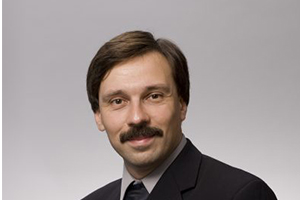“I really like learning and sharing what I learned,” says Oleg Rytchkov, an Associate Professor of Finance. “I’ve been thinking a lot about how to structure my own knowledge, how to see the big picture, and how to help others to see the big picture as well.”
Starting this academic year, Rytchkov is appointed as the new Chair of the Department of Finance at the Fox School. He earned a doctorate degree in Financial Economics from the Sloan School of Management, MIT in 2007. He also holds PhD in Physics from Steklov Mathematical Institute in Moscow. Prior to joining the Fox School in 2009, Rytchkov taught at the McCombs School of Business, University of Texas at Austin.
In his research, Rytchkov studies the functioning of capital markets and determinants of asset prices from both theoretical and empirical perspectives. His results have been published in top academic journals including the Journal of Finance, Review of Financial Studies, and Journal of Financial Economics. He also presented his work at many seminars and conferences including the most prestigious conferences in the field.
“In addition to having my work published in top journals and well cited, I’m proud of what my students have learned from me,” he says. “It’s really enjoyable watching how students grow professionally, and when they start thinking critically—how they start focusing on the right things and asking the right questions.”
With 12 years of experience in the department, Rytchkov is excited to take on the role of department chair. “Every chair has, and will have, their own challenges,” says Rytchkov. “But after (former head of the department) Jon Scott’s leadership over the last three years, and Dean Ron Anderson as the chair before that, I don’t have to worry about minutiae. The department is in great shape.” During his time at the Fox School, the culture of the finance department has become much more research-oriented, and the department has attracted many talented faculty to work and teach here.
Rytchkov explains that the department will work on becoming more efficient. He will reexamine course offerings and keep a close eye on the present and future of the industry. “We need to look at forecasting the future—where the profession is going and what the needs of employers are. I plan to communicate closely with alumni and potential employers to identify what skills our students have that are useful to organizations, and what skills students need more of now and in the future.”
For example, Rytchkov is already working with faculty on incorporating more machine learning and artificial intelligence skill-building into curricula at the Fox School.
“We don’t need a revolution, we need evolution. We have to be forward-looking and stay in touch with the current demands of the job market,” says Rytchkov.

